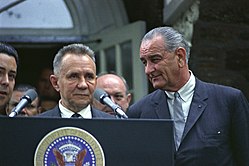Détente
Détente (pronounced day-tont) is a word that means less tension and a better relationship between two countries.
The main example of a détente was during the Cold War. In the 1970s, the United States and the Soviet Union improved relations. Both signed several treaties which reduced the amount of nuclear weapons each country had. During this time period, as China began to dislike the Soviet Union, the United States tried to make friends with China, giving the Soviet Union a disadvantage during the Cold War. This was often called “playing the China card.”
Détente primarily was concerned with relations between the US and USSR but other countries like China, West Germany, and most of the European states also played their role in developing it. Their motives were mixed. The US proposed this because they did not want to have to go to war with USSR which would lead to all out nuclear warfare.
The literal and original use of the word meant to undo a crossbow, the detention of the cord that launched the arrow.
Détente Media
Leonid Brezhnev, Viktor Sukhodrev, and Richard Nixon during Brezhnev's 1973 visit to Washington, D.C., a high-water mark in détente between the United States and the Soviet Union
Alexei Kosygin and Lyndon B. Johnson at the Glassboro Summit Conference in 1967
Gerald Ford and Leonid Brezhnev signing a joint communiqué on the SALT I treaty during the Vladivostok Summit in 1974
The Apollo–Soyuz crew in 1975
Ronald Reagan and Mikhail Gorbachev in 1985
Barack Obama and Raúl Castro at a press conference in Havana in 2016





